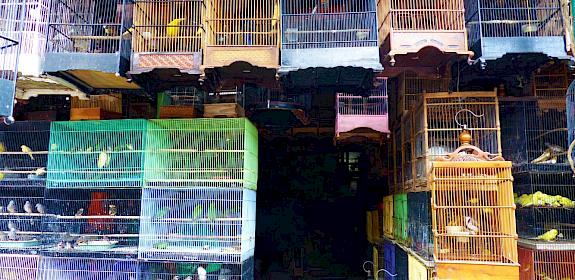CITES COP19 Decisions and listings come into force
Ninety days after the meeting at which they were adopted, the new and amended COP19 Decisions and Resolutions come into effect today. TRAFFIC calls for all involved in the implementation of the Convention to ensure that these commitments are translated into meaningful action on the ground. TRAFFIC also expresses concerns over the delay in implementing some species listings on the Appendices.
Just over a week ago, the CITES Secretariat published the new, revised and continued Decisions and Resolutions adopted at CoP19 in Panama last year.
Now the hard work truly begins. Despite the strong progress under CITES, illegal and unsustainable international trade continues to threaten species. All involved in the implementation of the Convention should reinvigorate their efforts to ensure that the decisions made at CITES CoP19 are reflected on the ground and at the national level to protect species vulnerable to illegal trade and work to support communities dependent upon legal and sustainable trade of wild species."
Sabri Zain, Director of Policy of TRAFFIC.
TRAFFIC will continue to support Parties with the tools necessary to regulate the trade in wild species, especially through the development of Non-Detriment Findings (NDF). TRAFFIC will also assist governments in addressing the diverse range of strategic over-arching issues faced by CITES, such as implementing the newly adopted guidance on demand reduction strategies and strengthening the role of the Convention in reducing the risk of future zoonotic disease emergence.
To support species-specific issues such as the illegal trade in ivory, TRAFFIC will strengthen its collaboration with the CITES Secretariat, the MIKE-ETIS Technical Advisory Group and Parties to ensure the Elephant Trade Information Systems (ETIS) continues to effectively support CITES in its decision-making.
TRAFFIC will continue to maintain a vigilant eye on trends in illegal or unsustainable wild species trade activity and works with partners to counter emerging threats like wildlife crime linked to the Internet and financial crime – an issue flagged in one of the CoP19 decisions adopted.
These decisions coming into effect today set the scene for the continued work over the next three years to CoP20 and the beginning of the work of CITES’ Working Groups and inter-sessional meetings. Notably, these include a CITES Working Group to further the limited progress seen thus far on vital engagement with indigenous peoples and local communities (IPLCs) and how to maximise legal and sustainable wild species trade benefits for livelihoods. The CITES Animals and Plants Committees meetings are already set for June this year and the Standing Committee in November.
As outlined in TRAFFIC’s CoP19 Summary, the new decisions will allow countries to make steady progress in regulating the trade of wild species and contribute to efforts to address global biodiversity challenges; however, for some species, that may not be fast enough.
Several species’ entries into the Appendices are delayed.
At CITES CoP19, TRAFFIC noted with concern that Parties had agreed to delay the implementation of a number of listings of species in the CITES Appendices.

Despite long being subjected to illegal and unsustainable trade for songbird competitions and recognised as species needing priority conservation action by the IUCN Asian Songbird Trade Specialist Group (ASTSG), there will be a controversial 12-month delay to the up-listing of rapidly declining and Critically Endangered Straw-headed Bulbul Pycnonotus zeylanicus to Appendix I. It’s listing in Appendix I of CITES would prohibit international commercial trade in wild-sourced specimens.
Similarly, there is a one-year delay in the landmark inclusion of all requiem sharks Carcharhinidae in Appendix II – as their parts are often indistinguishable from other already CITES-regulated shark species. There is also an 18-month delay in Appendix II listing three species of commercially, highly demanded sea cucumber genus Thelenota.
Out of the 150 timber-producing tree species from Central America, South America, and Africa to be listed in Appendix II, come today, three crucial genera of flowering Trumpet trees, Handroanthus spp., Roseodendron spp., and Tabebuia spp. and 14 species of Cumaru, Dipteryx spp., will still see an unprecedented two-year delay.
These delays in the implementation of the listings can present conservation challenges to the countries concerned. For instance, the long delay in entry into force for some timber can encourage unscrupulous actors to over-harvest and stockpile these timber species during this grace period before they come under regulation.

We urge relevant government departments to strengthen their monitoring of harvesting activities to prevent any abuse of the delay and ensure compliance with regulations and transparency in their operations. We also encourage governments to work with the industry to ensure the actors can implement the relevant CITES regulations effectively at the end of the two years grace period.
Chen Hin Keong, Senior Advisor for Forest, Governance and Trade of TRAFFIC.
TRAFFIC would like to remind Parties of the Resolution Conf. 13.6 (Rev. CoP17) calling on Parties to take any necessary measures to prevent the excessive acquisition of specimens of a species between the date on which the Conference of the Parties approves the inclusion of that species and the date on which the inclusion takes effect.
Between now and the date in which these delayed listings take effect, Parties must take the opportunity to prepare that the requisite legislation, regulations, management tools and enforcement capacity will be ready to support effective implementation of the listings. TRAFFIC stands ready to support Parties in this process."
Paola Mosig Reidl, Co-Lead of Data, Research and Enforcement Support of TRAFFIC.
Notes:
CITES – The Convention on International Trade in Endangered Species of Wild Fauna and Flora
CoP19 – The 19th Meeting of the Conference of the Parties to CITES
CoP20 – The 20th Meeting of the Conference of the Parties to CITES
CBD – UN Convention on Biological Diversity
MIKE – CITES Monitoring the Illegal Killing of Elephants Programme
ETIS – CITES Elephant Trade Information System
Convention on International Trade in Endangered Species of Wild Fauna and Flora (CITES)

The Convention on International Trade in Endangered Species of Wild Fauna and Flora, is an international agreement between governments that aims to ensure that international trade in specimens of wild animals and plants does not threaten their survival. Find out more here.





